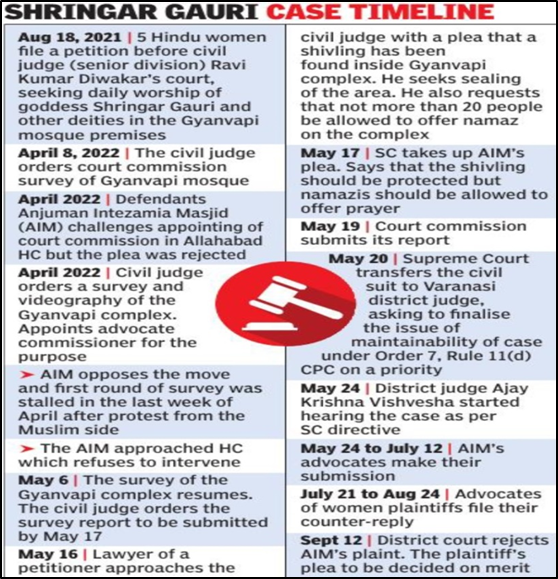In News:
- The court of the Varanasi district judge held as maintainable a suit filed by five Hindu women seeking the right to daily worship of Goddess Shringar Gauri and other visible and invisible deities in the Gyanvapi mosque complex.
- Maa Shringar Gauri and other visible and invisible deities were being worshipped incessantly till 1993.
- After 1993, the Uttar Pradesh government restricted the worship to one day a year.
What’s in Today’s Article:
Background:

News Summary
- The Varanasi District Court dismissed the challenge by Masajid Committee against the civil suits that sought the right to worship Maa Shringar Gauri and other deities within the Gyanvapi mosque premises.
- The district court held that it did not find any law that barred the petitioners from filing such a suit.
- This means that the cases can now be heard on merits where the parties have to present evidence to prove their claims.
- Under the Code of Civil Procedure, in the initial stage, allegations made in a suit must be prima facie accepted without going into the veracity of the claims, unless such a suit is barred by law.
- Once the suit is accepted, the onus of proving the claims would be on the plaintiffs.
Grounds on which Mosque side opposed the suit and the ruling of the district court
- The Places of Worship Act, 1991
- Mosque committee had alleged that the current suit violated Sections 3 and 4 of the Places of Worship Act, 1991.
- These sections mandated that one cannot tinker with any place of worship which has been existing and where worship has been performed as on August 15, 1947.
- e., the religious character of a place of worship existing on the 15 August, 1947 shall continue to be the same as it existed on that day.
- The Varanasi court said in its order that the Places of Worship Act does not bar the civil suit.
- It relied on the argument that even after August 15, 1947, the religious character of the Gyanvapi mosque allowed for prayers to Hindu deities.
- It said that the petitioners have not sought the relief for converting the place of worship from a mosque to a temple.
- The Wakf Act, 1995
- The Muslim side argued that the subject matter of the civil suit is a Wakf property.
- According to Section 85 of the Act, only the Wakf Tribunal, Lucknow, can decide the suit.
- But the court said that the suit is not barred by the Wakf Act.
- The Wakf Act, according to the court, is to solve disputes within the community and not to extinguish claims from outside the community.
- Kashi Vishwanath Temple Act, 1983:
- The Muslim side also challenged the civil suits on the grounds that under this Act, the temple land was clearly demarcated, and that the Board of Trustees appointed under law did not interfere in the case.
- The court ruled that this Act of 1983 does not specifically bar a suit claiming right to worship idols installed in the endowment within the premises of the temple, or outside.









